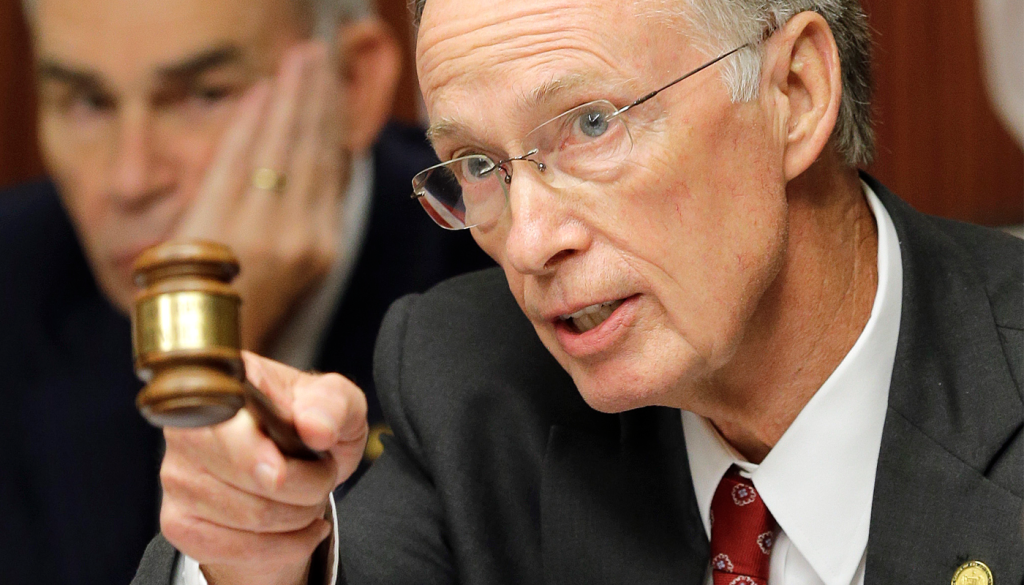Alabama agrees to changes for inmates with disabilities

A federal judge on Friday gave final approval to a lawsuit settlement regarding how inmates with disabilities are housed in Alabama prisons. U.S. District Judge Myron Thompson signed the agreement reached between inmates and the Alabama Department of Corrections. The state prison system agreed to survey prison facilities and make changes to settle claims brought by inmates under the Americans with Disabilities Act and the Rehabilitation Act. The department will have 32 months to make any architectural changes required to make sure inmates with disabilities are appropriately housed and can access prison programs and facilities. The state also agreed to screen inmates for physical, mental or intellectual disabilities and to hire and train ADA coordinators. Disabled inmates said in the 2014 federal lawsuit that they were kept in facilities that couldn’t safely accommodate them, were denied access to prison education, work release and other programs because of their disabilities and were sometimes inappropriately housed with higher security inmates solely because of their disabilities. During a fire, a prisoner in a wheelchair had to maneuver deeper into the prison to access a ramp to the outside, according to the lawsuit. Thompson had given preliminary approval to the settlement in June. “The Alabama Department of Corrections is committed to meeting its obligations as set out in the settlement agreement,” Commissioner Jeff Dunn said in a statement. Thompson praised both the inmates who brought the lawsuit and the state prison system for agreeing to make changes. “This settlement reflects the Alabama Department of Corrections’ commitment to making manifest the rights of disabled prisoners in its custody; it represents the shouldering of significant responsibility, and presents an equally significant opportunity, by delineating a years-long process of ensuring compliance with the dictates of federal disability law,” Thompson wrote. Thompson wrote that the federal laws were meant to protect people with disabilities from being shunted and ignored. “Prisoners, looked down upon by society and hidden from public view, are likewise at risk of such treatment. Absent the protections created and processes mandated by the ADA and accompanying regulations, and without effective oversight, prisoners with disabilities are doubly damned,” Thompson wrote. The issue of housing for disabled inmates is part of a broader lawsuit filed by inmates over prison medical care. A group of inmates filed a civil lawsuit in 2014 that accused the state of failing to provide basic medical and mental health care. Those claims have not yet gone to trial. Republished with permission of The Associated Press.
Supreme Court rejects appeal over Cottonwood man’s life sentence in marijuana case

The U.S. Supreme Court on Monday declined to hear an appeal in a case of a 76-year-old Cottonwood, Ala. man who was sentenced to life in prison without parole for possessing less than three pounds of marijuana. In October 2014, Lee Carroll Brooker was sentenced to life in prison in without parole under the Yellowhammer state’s habitual offender law. Brooker, a disabled veteran suffering from chronic pain, claimed the marijuana plants grown behind his son’s house were for medicinal use. There is no medical use exemption for growing marijuana under Alabama state law. Lawyers for Brooker argued the sentence violates the U.S. Constitution’s ban on cruel and unusual punishment. Nevertheless the justices from the high court let the original sentence stand. Thursday, The New York Times editorial board agreed with Brooker’s lawyers and urged the Supreme Court to hear the case. “The justices should take the case and overturn the sentence… Life without parole, second only to the death penalty in severity, should never be a mandatory sentence for any crime, much less for simple possession of marijuana, which is not even a crime in many parts of the country,” the editorial read. “Mr. Brooker’s punishment for marijuana possession is the definition of cruel and unusual.” Last September, the Alabama Supreme Court also declined to hear the case. But that didn’t stop Alabama Chief Justice Roy Moore from writing a separate concurrence to the court’s decision questioning the “grave flaws” in Alabama’s sentencing system. “I write separately because I believe Brooker’s sentence is excessive and unjustified,” Moore wrote in his concurrence. “Under circumstances like those of Brooker’s arrest and conviction, a trial court should have the discretion to impose a less severe sentence than life imprisonment without the possibility of parole.” Moore continued: “In my view, Brooker’s sentence of life imprisonment without the possibility of parole for a non-violent, drug-related crime reveals grave flaws in our statutory sentencing scheme. I urge the legislature to revisit that statutory sentencing scheme to determine whether it serves an appropriate purpose.” According to the Alabama Department of Corrections website, Brooker is serving his sentence at Holman Prison in Atmore.
Robert Bentley announces plans to veto General Fund budget

Gov. Robert Bentley has released a statement announcing his plans to veto the recently passed General Fund budget, which fails to adequately fund the state’s Medicaid program. “The General Fund Budget is unacceptable because it lacks adequate funding for essential government services,” Bentley said in the Thursday statement. “The proposed appropriation falls short of what the Medicaid Agency will require to provide services for the over one million Alabamians, most of them children, covered by Medicaid.” Bentley also noted that the current budget will render Medicaid reform measures passed in 2013 “unsustainable.” “The state has already made great progress to remodel and streamline the Medicaid model to a regional managed-care system,” Bentley remarked. “That progress will be lost without adequate funding from the General Fund.” In the statement, Bentley also mentioned his concerns about funding for the Alabama Department of Corrections, which he says is necessary to “address the prison crisis long-term.” “We have made strong reforms in the prison system; however, insufficient funding hinders the department’s efforts for further reform,” Bentley said. “We have witnessed the dangerous conditions inside our state-operated prisons, and the Alabama Legislature must prioritize prison system safety with adequate appropriations.” Bentley further chastised lawmakers for using “millions” in one-time BP settlement money to pay for “recurring expenses,” a move the governor claims is “fiscally irresponsible and shortsighted.” “Because of these concerns, I will veto the General Fund Budget and send it back to the Legislature on April 5th when they return,” Bentley said in closing. “I am committed to working with the Legislature to address our General Fund budget challenges.” Unlike other states, which require a two-thirds vote to overturn a veto, Alabama only requires a simple majority in both houses to override the governor’s veto. Because of that, the Republican majority in the state legislature will easily be able to undo Bentley’s action.
State settles claim involving disabled inmates

Alabama has agreed to change how inmates with disabilities are treated and housed to settle part of a broader lawsuit over prison medical care. U.S. District Judge Myron H. Thompson will hold a Thursday hearing on the proposed settlement filed this week in federal court in Montgomery. In the proposed settlement, the state agreed to make sure inmate housing is compliant with the Americans with Disabilities Act and inmates can access programs and facilities. “This agreement is an important commitment by the Alabama Department of Corrections to address the discrimination and hardship these prisoners have faced for far too long,” said Maria Morris, a Southern Poverty Law Center attorney representing inmates. The lawsuit contended disabled inmates were kept in facilities that couldn’t safely accommodate them and were inappropriately housed with higher security inmates for no reason other than their disabilities. It also claims they didn’t have access to programs and devices, including functioning wheelchairs. During a fire, a wheelchair-using prisoner had to maneuver deeper into the prison to access a ramp to the outside, according to the lawsuit. The settlement agreement noted Alabama Gov. Robert Bentley‘s proposal to build four new prisons to replace existing facilities but said that monitoring of settlement compliance will continue regardless of whether the state builds new prisons. The Alabama Senate could vote on the proposed $800 million bond issue next week. “The Alabama Department of Corrections agrees that the filed settlement charts a sensible and prudent path to addressing ADA compliance issues caused largely by antiquated correctional facilities,” Corrections Commissioner Jeff Dunn said in a statement. “A proposal that is currently before the Alabama Legislature to transform the state’s prison system will allow for the construction of four new state-of-the-art facilities that will comply fully with ADA standards, and will go a long way in helping the department meet the terms of the settlement.” A group of inmates filed a civil lawsuit in 2014 that accused the state of failing to provide basic medical and mental health care to inmates. The remaining claims could go to trial later this year. “While we are pleased to have resolved these claims on behalf of prisoners with disabilities, this case is far from over,” said Lisa Graybill, deputy legal director of the Southern Poverty Law Center. Dunn said the department believes the remaining claims are without merit. “While the settlement only addresses ADA issues, the department believes it is providing constitutionally adequate medical and mental healthcare and services to offenders incarcerated in Alabama prisons,” Dunn said. Republished with permission of The Associated Press.
Prison reform bill passes committee, moves forward to full Senate

On Wednesday, the Senate Committee on General Fund Taxation and Finance passed the long-debated Alabama Prison Transformation Initiative Act, clearing its path to go before the full Senate next week. SB287 from Sen. Trip Pittman (R-Daphne) provides an $800 million revenue bond for the demolition of 14 of Alabama’s 16 prisons and subsequent renovation of the remaining two. The bill further provides for the construction of four new prisons, three male and one female, which will pay off the bond through perceived savings. As collateral, the bill provides a 1-mill tax currently reserved for funding the Alabama Department of Human Resources (ADHR) and the Alabama Department of Veterans Affairs (ADVA). Proponents say that the tax would only be used if the Alabama Department of Corrections (ADOC) defaults on its bond payments, which is not expected to happen. In previous committee meetings, opponents spoke out against the 1-mill tax commitment as well as the design/build method laid out in the bill, which state contractors have argued would stifle competition and have a negative effect on local companies. With the 1-mill tax concerns in mind, Sen. William Holtzclaw (R-Madison) offered an amendment which would protect the ADVA and ADHR. If forced to use the money because of an ADOC default, money would taken from each agency incrementally and, if funding became unsustainable, future legislatures would be forced to fully fund both departments. The amendment further imposes a sunset on the 1-mill tax commitment to alleviate concerns that it could be on the table for many years to come. The amendment was unanimously approved, with only Pittman abstaining from the vote. In regard to the design/build method, which repeatedly drew the ire of state engineers and architects, Pittman alleged that altering that language would be a nonstarter for Gov. Robert Bentley, who contends that the method is best for the state and the project. State Finance Director Bill Newton noted that design/build would shorten the time of construction by one year and save the state about $100 million. Many committee members spoke favorably of the legislation, despite the longstanding uproar and inner-concerns over the bill. “Don’t let this die in committee today and we lose the only vehicle we have for improving those facilities,” said Sen. Cam Ward (R-Alabaster). “That would be a terrible, terrible shame for all of us.” “If this is the only way we can make things better then we ought to do it,” said Sen. Priscilla Dunn (D-Bessemer). “I think it’s time that we try to do something about it. We need to do something about these prisons.” In the end, only Sen. Paul Sanford (R-Huntsville) voted against the bill.
Prison reform bill faces more opposition in Senate committee

The Senate Committee on General Fund Finance and Taxation took up the Alabama Prison Transformation Initiative Act during a hearing Wednesday when, again, lawmakers were bombarded with opposition from state architects, engineers and contractors in regard to the bill’s design/build mandate. The bill faced much the same outcry when it went before a House committee last week. “It’s a good plan,” said Sen. Trip Pittman (R-Daphne), the Senate bill’s sponsor. “But there are people opposed to it.” As per the ideas laid out in the “State of the State” address by Gov. Robert Bentley, SB287 calls for the demolition of all but two of Alabama’s 16 prisons and provides $800 million in bonds to pay for the construction of four new facilities. Alabama Department of Corrections (ADOC) Commissioner Jefferson Dunn laid out the plan. “Over the last 40 or 50 years, every governor and every member of the legislature has always been faced with the issue of corrections,” Dunn said. “We are bringing forth a plan that we believe will address these longstanding problems.” Dunn noted that the planned move would free up more resources for rehabilitation and reentry, noting that more than 80 percent of prisoners will one day join the citizenry. The four facilities being constructed – one female prison with 1,200 beds and three male prisons with 4,000 beds a piece – will cut overtimes costs for the department, as well as costs related to transportation and healthcare. Along with the four to be constructed, two current facilities will be renovated. While most committee members noted support for the measure, concerns were vast and widespread. Many were interested in which facilities would be demolished and which would remain, as well as how the ADOC would come up with the roughly $50 million required to make the annual bond payments. Sen. William Beasley (D-Clayton) noted that three prisons are in his district and their removal would “devastate” the local economy. But the concerns of lawmakers weren’t the only ones voiced – in all, seven people stood to voice their opposition to the bill. While most were architects and contractors, concerned that the bill upends the traditional design/bid/build model. Clyde Marsh, Commissioner of the Alabama Department of Veterans Affairs (ADVA), voiced concern over the bill’s use of a one-mill tax currently reserved to fund the ADVA and the Department of Human Resources as collateral for the bonds. In the event that the ADOC was unable to make its payments, the tax would be diverted to make up those payments. Lawmakers took no vote on the bill and will appear before the committee again next week.
House committee hears debate over prison transformation bill

One of the hallmark ideas laid out in the “State of the State” address by Gov. Robert Bentley, a plan to demolish all but two of Alabama’s 16 prisons and replace them with four new facilities, went before the House Ways and Means General Fund Committee Wednesday. The Alabama Prison Transformation Initiative Act, HB313, provides for the sale of about $800 million in bonds for the construction of four super-prisons and the renovation of two facilities yet to be determined. The remaining 14 prisons would be demolished. During the committee hearing, it was revealed that these bonds are to be paid by the Alabama Department of Corrections (ADOC), which will pay a lease on the new facilities to the Alabama Corrections Institute Finance Authority (ACIFA). The rent paid to the ACIFA would then be used to pay off the bonds. In order to get a higher bond rating and, in turn, a lower interest rate, the state put up its 1 mill of property tax as collateral on the bonds. Those funds are currently used to help fund the Alabama Department of Veterans Affairs (ADVA). That raised the ire of ADVA Commissioner Clyde Marsh, who said the department wouldn’t be able to function without the money generated from the 1 mill tax. “We can’t do without that,” Marsh said, noting that the funds generated from the tax account for about $34 million in funding. “You’re putting veterans at risk if you do that.” State Finance Director Bill Newton clarified that the ADVA would still receive that money, it was simply “put up” as a way to acquire better rates from Wall Street. Despite that, Rep. John Knight (D-Montgomery) opposed using veterans’ funding as collateral and was joined in his disdain by Rep. Arnold Mooney (R-Birmingham). Mooney recommended offering up hard assets or land as collateral in place of the 1 mill tax, which Newton said he would explore. Additional concern over the bill came from a slew of architects, engineers and contractors who opposed language in the bill that they said would stifle competition and possibly put taxpayer dollars in jeopardy by allowing contractors to hire their own architects to oversee construction. The argument, as it was presented, notes that if contractors are able to hire their own architects or engineers, those workers will serve at the pleasure of the contractor and be less likely to make efforts to ensure the job is done correctly and efficiently. Rhonda Brownstein, Legal Director for the Southern Poverty Law Center, voiced concerns over building new prisons rather than passing further reforms to reduce the number of prisoners in Alabama’s prison system, noting that reforms passed last year have not even been allowed to play out yet. “Before we move forward with a plan to spend $1 billion, we should see how the current reforms work out,” Brownstein said. “We also need to engage in further reforms, deeper reforms, to get more people out of prison.” Brownstein’s comments drew the wrath of Rep. Connie Rowe (R-Jasper), who noted that the focus should be on attaining better conditions for those people already in prison, rather than finding ways to get people out of prison. “I would build several more prisons and lock a lot more people up,” Rowe said. Rep. Victor Gaston (R-Mobile) concurred saying, “We don’t lock up enough people.” ADOC Commissioner Jefferson Dunn discussed his department’s efforts in evaluating the state’s prison problems and instituting “effective, evidence-based” methods for improving conditions for Alabama’s prisoners. Alabama currently ranks third in the country for most people incarcerated. “A prison is much like a small city with a population that has to be cared for,” Dunn said. “To the extent that we can go from running 16 small cities to running six small cities, we will see significant savings from that alone.” Because public input was widespread, as well as questions and concerns from committee members, no vote was taken on the legislation and it will be taken up again in next week’s meeting.
Robert Bentley announces plan to transform Alabama prison system

In keeping with promises made during his recent “State of the State” address, Gov. Robert Bentley announced plans Tuesday to reform Alabama’s overwhelmed prison system. The Alabama Prison Transformation Initiative Act (APTIA), which will outline the closing of Alabama’s current prisons and the construction of “four modern efficient prison facilities,” will be announced Tuesday and carried by Rep. Steve Clouse (R-Ozark) and Sen. Trip Pittman (R-Montrose) in the House and Senate, respectively. “We have made significant progress over the last year to improve our criminal justice system, and with the construction of four new and modern prisons, Alabama is poised to be a national leader in safe and effective incarceration of inmates,” Bentley said in a press release. “We cannot move our state forward without addressing the issues that have plagued the prison system for decades. We have a good plan to address the issues and with the partnership of the Alabama Legislature, we can solve the issues and make the Department of Corrections more efficient.” Many of Alabama’s prisons are aged and inefficient, which increases the costs associated with maintenance and repair. Because the outdated facilities don’t provide in-house medical care, additional costs for prisoner transported are also associated with the outdated prisons. The new plan would “reduce overcrowding and improve safety conditions for inmates and corrections officers, allow for additional inmate re-entry programs and to improve operational practices and procedures for the Alabama Department of Corrections (ADOC).” The plan will also provide for $800 million in bonds over 30 years, which is said to be reimbursable from the savings the ADOC will see because of the new prison system. The four facilities will include three men’s facilities able to house “at least” 3,500 prisoner each. Construction is slated to begin next year and will be completed within three years.
Robert Bentley testifies before Congress on Alabama prison reforms

Gov. Robert Bentley on Tuesday testified before a U.S. House panel on the topic of recent reforms in the Alabama statehouse designed to limit long prison sentences for nonviolent offenders and increase inmate rehabilitation efforts, to reduce rates of recidivism and the high cost of housing the state’s incarcerated population. In a statement shortly after a hearing of the House Oversight and Government Reform Committee, Bentley touted Alabama’s reforms as a model for the nation. “Prison reform is an important issue in Alabama,” Bentley said. “Alabama has made significant progress over the last year to improve our criminal justice system, ease some of the challenges in our prison system and maximize the amount of state dollars we spend for the Alabama Department of Corrections. “I believe that our prison reform efforts have created a healthy foundation that can, over time, transform the landscape of the entire criminal justice system for the better.” Alabama, in turn, is following suit on a larger national push for “smart justice,” involving changes to federal sentencing guidelines, a move away from mandatory minimums to give more discretion to judges and focusing on giving former inmates viable alternatives away from criminal activity. Bentley praised congressional leaders for opening its doors to state leaders like him, invoking the old saw about states being the “laboratories of democracy.” “States can be laboratories of changes, creating unique opportunities that can address problems. I believe that Alabama is a national model for prison reform, and it was an honor to share our efforts with Congress,” Bentley said in a prepared statement. The move comes just a day after legislative leaders in Arizona called on Alabama Rep. Mike Jones for counsel on the changes he helped institute along with Sen. Cam Ward during the regular Legislative Session. Jones said on the occasion of his visit to the Grand Canyon state that he, too, hopes Alabama’s recent amendments to its criminal code can help show a way forward for a nation whose prison system is clogged with nonviolent offenders.
New prison commissioner Jeff Dunn says overcrowding at root of other problems

Alabama’s new prison chief has been on the job less than two months, but he says it’s clear that overcrowding is the overall problem that covers many of the systems other challenges: security risks, staffing levels, officer turnover and culture. “It is readily acknowledged for almost two decades the state has struggled to adequately resource the prison system,” Department of Corrections Commissioner Jeff Dunn said. “When you should have 10 officers for a particular area or function, and you only have six or you only have five then it’s obvious to be at least those five officers are having to do the work of 10 … It raises our security risk,” Dunn said. Dunn in April took the helm of a prison system with well-documented troubles. State prisons in January housed 25,102 inmates in facilities designed to hold 13,318, putting the system at 188 percent capacity. The crowding level has contributed to risky conditions for those on both sides of the prison bars. “We have significant resource challenges and they are chronic. They are not recent. In large institutions that have been chronically under-resourced, that results in security issues, personnel issues, facility maintenance issue and it also results in cultural issues,” Dunn said. The new head of the state prison system does not have a background in running state prisons. And that is by design. Dunn, a native of Alabama, retired as a colonel from the Air Force in March after a 28-year career. His most recent command was of the Thomas Barnes Center for Enlisted Education at Maxwell Air Force Base in Montgomery. He also served as vice commander of the 14th Flying Training Wing at Columbus Air Force Base, Mississippi and as deputy director for combating terrorism and support activities for the office of the Secretary of Defense. Gov. Robert Bentley, when he swore in Dunn, said he was specifically looking for someone from the outside to make changes in a system, where critics have accused the state of letting problems and problem personnel linger. Dunn said he has experience with “large complex organizations” where problems and decisions are rarely simple. Dunn’s challenge is getting up to speed on how corrections operates. He has spent the last six weeks studying the system. He said his top task this summer is to spend time on the ground in the prisons. He spends a lot of time asking,” Why do we do it that way?” and asking staff what they need to do their jobs better. “I think the vast majority of the men and women in this department are professional, faithful public servants who want to do the right thing and want to serve the state in an honorable and faithful manner. I believe that. I do believe, just like any large institution, we have some folks aren’t on board with that and we’re going to address that.” Two state prisons in particular have been in the spotlight. The U.S. Department of Justice on Thursday announced a settlement agreement with the state over conditions at Tutwiler Prison for Women where federal officials say inmates were subjected to an unconstitutional climate of constant sexual abuse and harassment. Bryan Stevenson, executive director of the Montgomery-based Equal Justice Initiative, said the while the state has focused on improving Tutwiler, conditions at other state prisons have gotten “dramatically worse” over the last 18 months Stevenson’s organization initially raised the alarm about Tutwiler and has sued the state over violence at another prison. Republished with permission of the Associated Press.
State Senate leader files plan to check Medicaid, prison spending

Senate President Pro Tem Del Marsh has introduced a plan to address what he sees as the deeper issue in the current budget dilemma: growth in state spending on Medicaid and corrections. Late last week, Marsh filed Senate Bill 476 to limit the Alabama Medicaid Agency to no more than 10 percent Alabama’s total discretionary spending and to keep funding for the Alabama Department of Corrections below 5.5 percent. According to a Yellowhammer News report, Medicaid now accounts for about 9 percent of Alabama’s appropriations and corrections makes up 5.1 percent. Marsh told Yellowhammer News that he brought the bill because of his concerns over how the two programs have expanded in recent years. Here’s a quote from that interview: “Because of the budget situation, we have been forced to take a deep dive into the issues with the General Fund and look at ways to make deliverable changes in the way we spend taxpayer money,” Marsh said. “This bill gives both Medicaid and corrections room to grow from their current allocation but caps the amount so we can begin to control spending within those two programs.” Appropriations for both programs come from the state general fund: the Alabama Medicaid Agency absorbs about 35 percent of the general fund and corrections accounts for another 20 percent. However, Alabama’s healthiest revenue streams – personal income and sales taxes – are earmarked for the Education Trust Fund, not the general fund. The governor has cited lack of revenue in the general fund as the basis for his plan to increase taxes by $541 million. So far, lawmakers have failed to come to consensus on how to address the shortfall.


